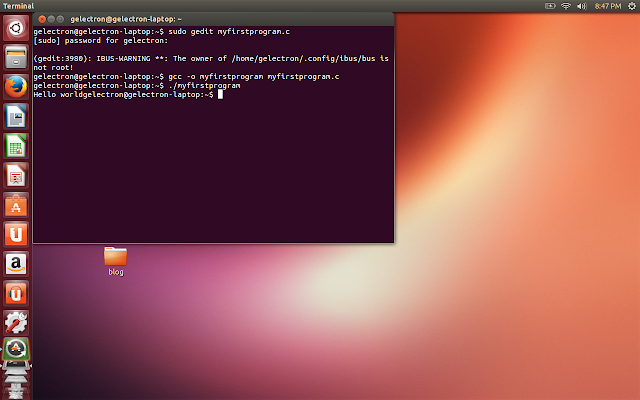
* main.c
*
* Created on: Aug 12, 2017
* Author: thannara123
#include
#define FALSE 0
#define TRUE 1 // 0r //!FALSE
struct menu
{
char menu_up_key;
char menu_down_key;
char menu_enter_key :1; // bit feild 1 bit
};
struct menu s1= {0}; //s1.menu_up-key =1;
void struct_1( struct menu,const char *menu_display[]);
int main()
{
const char *menu_display[10];
menu_display[0] = "Menu0";
menu_display[1] = "Menu1";
menu_display[2] = "Menu2";
menu_display[3] = "Menu3";
menu_display[4] = "Menu4";
menu_display[5] = "menu 5";
menu_display[6] = "menu 6";
struct_1(s1,menu_display);
getchar();
return 0;
}
void struct_1(struct menu s1 ,const char *menu_display[])
{
char ch;
do{
ch=getch();
if(ch!='\0')
{
ch=getch();
if(ch=='H')
{
s1.menu_up_key++;
if(s1.menu_up_key==7)
s1.menu_up_key =0;
// printf("UP\n");
printf(" %s\n",*(s1.menu_up_key+menu_display));
}
else if(ch=='P')
{
s1.menu_up_key--;
if(s1.menu_up_key==-1)
{ s1.menu_up_key =6;
goto here;
}
//printf("down\n");
here:
printf("%s\n",*(s1.menu_up_key+menu_display));
}
}
}
while(ch!='e');// while oka key
}
/*
* button_key.c
*
* Created: 7/30/2017 12:02:39 PM
* Author: Krishna
*/ #include
#include "delay.h"
#include "button_key.h"
#include "lcd.h"
void menu_key_display(struct menu s1,const char *menu_display[]);
void UP_Down_Keyvalue(struct menu s1,int i,int j);
/* Function Key Value For get key */
int Key_pressed(void)
{
while(1){
if (LEFT_S) { while(LEFT_S);return 1; }
if (RIGHT_S){ while(RIGHT_S);return 2; }
if (UP_S) { while(UP_S); return 3; }
if (DOWN_S) { while(DOWN_S);return 4 ; }
if (OK_S) { while(OK_S);return 5 ; }
}
}
/* Function Key Value For Up Key & Enter*/
void menu_key_display(struct menu s1,const char *menu_display[])
{
int ch;
int a;
int menu_position =0;
LCD_DisplayString(menu_display[menu_position]);
do{
repat:
ch = Key_pressed();
if(ch==1||ch==2)
{
if(ch==2)
{ if(ch==2)
{ if(s1.menu_side_key==4)
s1.menu_side_key = 0;
LCD_Clear();
LCD_GoToLine(0);
LCD_DisplayString(*((++s1.menu_side_key)+menu_display));
menu_position=1;
}
}
else if(ch==1)
{
if(ch==1)
{if(s1.menu_side_key==1 ||s1.menu_side_key==0)
{
s1.menu_side_key=5;
}
LCD_Clear();
LCD_DisplayString(*((--s1.menu_side_key)+menu_display));
menu_position=1;
}
}
}
if(menu_position==0)
goto repat;
}while(ch!=5);
a = s1.menu_side_key;
switch(a)
{
case 1: // set time
{
LCD_Clear();
LCD_GoToLine(0);
LCD_DisplayString(menu_display[5]);
LCD_GoToLine(1);
LCD_DisplayString(" HH:MM:SS:PM/AM");
UP_Down_Keyvalue(s1,2,4);
break;
}
case 2: // Set date
{
LCD_Clear();
LCD_GoToLine(0);
LCD_DisplayString(menu_display[6]);
LCD_GoToLine(1);
LCD_DisplayString(" DD:MM:YY");
UP_Down_Keyvalue(s1,2,3);
break;
}
case 3: // set alarm
{
LCD_Clear();
LCD_GoToLine(0);
LCD_DisplayString(menu_display[7]);
LCD_GoToLine(1);
LCD_DisplayString(" HH:MM:SS:AM/PM");
UP_Down_Keyvalue(s1,2,4);
break;
}
case 4: // set alarm
{
LCD_Clear();
LCD_GoToLine(0);
LCD_DisplayString(menu_display[8]);
LCD_GoToLine(1);
LCD_DisplayString(" HH:MM:SS:PM/AM");
UP_Down_Keyvalue(s1,2,4);
break;
}
}
while(Key_pressed()!=5);
}
/* Function Key Value For UP_Down Key */
void UP_Down_Keyvalue(struct menu s1,int i,int j)
{
int ch,lower,upper;
do{
if(j==4)
{
if(i==2)upper=1;
if(i==3)upper=9;
if(i==5)upper=5;
if(i==8)upper =5;
if(i==9)upper =9;
}
if(UP_S)
{
while(UP_S);
if(s1.menu_up_key==upper)
s1.menu_up_key = lower-1;
LCD_GoToXY(1,i);
LCD_Printf("%d",++s1.menu_up_key);
s1.time[i-2]=s1.menu_up_key;
}
else if(DOWN_S) // down
{ while(DOWN_S);
if (s1.menu_up_key==lower)
s1.menu_up_key = upper+1;
LCD_GoToXY(1,i);
LCD_Printf("%d",--s1.menu_up_key);
s1.time[i-2]=s1.menu_up_key;
}
if(RIGHT_S)
{ while(RIGHT_S);
s1.menu_up_key=0;
if(i==9) goto exit1;
if(i==3||i==6)
++i;
i++;
}
exit1:
if (LEFT_S)
{ while(LEFT_S);
s1.menu_up_key=0;
if(i==2) goto exit2;
if(i==5||i==8)
--i;
i--;
}
exit2:continue;
} while (ch!=5); // if Okay key exit loop
}
See You












